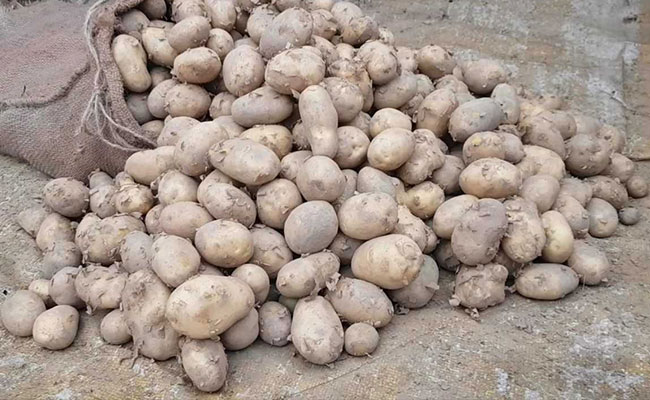A recent study found that nutrient-rich potatoes can be part of a healthy diet in young teens during this important period of growth and development.

Teens who consumed a cup of potatoes had no increased risk of heart disease
A new study has found that 9-17-year-old girls who consumed up to one cup of potatoes daily had no increased risk of becoming overweight or developing high blood pressure, dyslipidemia, or impaired fasting glucose.
The findings of the study were published in 'British Journal Of Nutrition'.
Adolescence is a critical period for the evolution of cardiometabolic risk factors that are largely influenced by diet and lifestyle. Understanding these risk factors is essential to developing effective dietary guidance for disease prevention targeting this critical age period.
According to the 2020-2025 Dietary Guidelines for Americans, girls aged 9 - 18 are encouraged to consume 1 1/2 to 3-cup equivalents per day of vegetables, depending on their calorie needs, but most fail to meet these guidelines. In this study, the highest levels of potato consumption ranged from 1/5 to 1 cup per day and at that level, no adverse effects were observed.
"Our results show that nutrient-rich potatoes can be part of a healthy diet in young girls during this important period of growth and development," said Lynn L. Moore, DSc, MPH, Boston University, the study's senior author.
"There is growing evidence that overall diet quality is what really matters in the preservation of heart health. Potatoes are an affordable food, with a number of valuable nutrients, and our research suggests that moderate intakes of potatoes, along with many other types of vegetables, can be a regular part of a healthy diet pattern," added L. Moore.
Higher intakes of all forms of potatoes (including fried) during the 'tween' years of nine to 11 were associated with higher intakes of potassium and dietary fibre, two nutrients of public health concern, as well as vitamin C, vitamin B6 and magnesium. Black girls in this study with the highest intakes of potatoes also consumed more fruit and non-starchy vegetables and had higher diet-quality scores.
The researchers analysed data from nearly 2,000 subjects (approximately 50 per cent Black, 50 per cent White) from the National Growth and Health Study, a longitudinal study of the development of obesity and other cardiovascular-related outcomes in adolescent girls.
For girls at 9-11 years of age, researchers analysed data on total potato intake (white and sweet) as well as separate intakes of fried and non-fried potatoes.
For girls at 9-17 years of age, researchers analysed data for total potato intake (white and sweet).
Diet was assessed using 3-day diet records at baseline when girls were 9-10 years old, and during the follow-up years 2-5, 7, 8, and 10. The intake of potatoes (both white and sweet potatoes) was extracted from total vegetable servings.
Anthropometric measures of body fat and body composition and blood pressure were measured annually. Additionally, fasting triglycerides, other lipids, and glucose were measured in later adolescence (at 18-20 years of age)
Repeated measures of a number of potential confounding variables were examined, including socioeconomic status, body mass index (BMI), changes in height, physical activity, television viewing, intakes of food groups and nutrients, as well as diet quality measured by the Healthy Eating Index (HEI)-2015.
The study's strengths include its prospective design as well as the use of multiple sets of three-day diet records, which is considered the gold standard method for dietary assessment. Researchers also took repeated measures of cardiometabolic risk factors and most potential confounders.
The investigators acknowledge limitations to the study, such as reliance on self-reported dietary intakes from adolescents who may have had difficulty accurately estimating portion sizes and reporting details. However, parents and other caregivers were actively involved in the completion of these diet records, especially during the earlier years of the study.
Researchers were unable to assess the effects of very high levels of potato intakes since few girls reported consuming more than one cup equivalent of potatoes per day. They were also unable to analyze any differences between white and sweet potato consumption, given the low intakes of sweet potatoes within the study population. Finally, the researchers were unable to control for baseline values of fasting glucose or triglycerides due to missing or unreliable data at the initial exam.
Authors of the study include Ioanna Yiannakou, Mengjie Yuan, R. Taylor Pickering, Martha R. Singer, and Lynn L. Moore, Boston University.
(This story has not been edited by NDTV staff and is auto-generated from a syndicated feed.)
DoctorNDTV is the one stop site for all your health needs providing the most credible health information, health news and tips with expert advice on healthy living, diet plans, informative videos etc. You can get the most relevant and accurate info you need about health problems like diabetes, cancer, pregnancy, HIV and AIDS, weight loss and many other lifestyle diseases. We have a panel of over 350 experts who help us develop content by giving their valuable inputs and bringing to us the latest in the world of healthcare.














